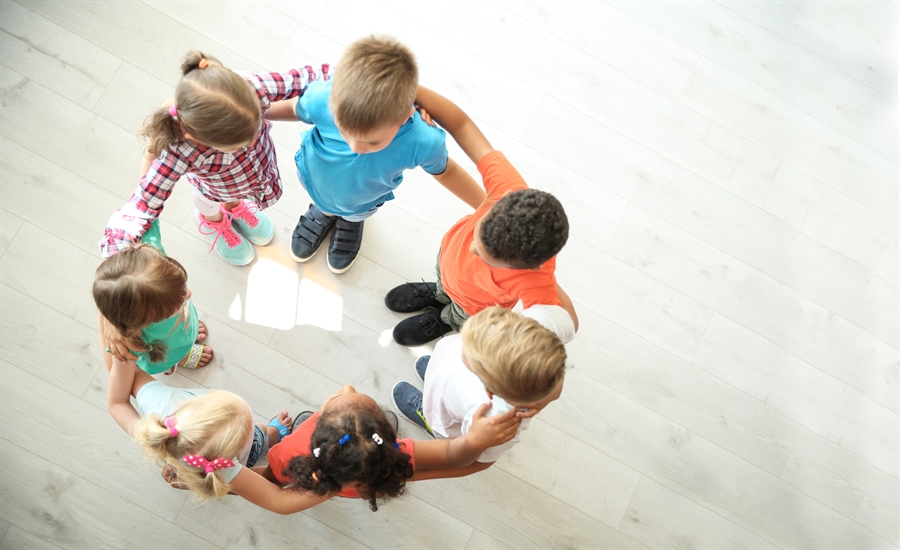子どもが成長していく上で、友達との関係づくりは非常に重要なテーマの一つです。幼児期から小学校、中学校へと進むにつれ、子どもの世界は徐々に広がり、多様な人間関係に触れる機会が増えていきます。自分と異なる性格や価値観を持つ友達と関わりながら、コミュニケーション能力や協調性、自己肯定感など、多くの力を育んでいくのです。
しかし、友達づくりは子どもにとって、ときに大きな挑戦でもあります。「上手に話しかけられない」「相手の気持ちがわからない」「仲間外れにされるのが怖い」など、不安や戸惑いを感じることが少なくありません。そこで、親としてどのようにサポートすれば子どもの人間関係を豊かにし、安心して成長を見守ることができるのでしょうか。本ブログでは、友達との関係づくりを促進し、子どもの心を支える親の役割について考えていきます。
1.子どもにとっての「友達」の意味
子どもは友達とのやり取りを通じて、社会性を身につけたり、自分自身を客観的に捉えたりする機会を得ます。大人から見ると些細なことでも、子ども同士にとっては大きな出来事であり、感情が大きく揺れることもしばしば。ケンカやトラブルを経験するたびに、子どもは「どうすれば相手と気持ちよく過ごせるか」「自分の思いをどう伝えたらいいか」と試行錯誤を重ねていきます。
また、友達の存在は子どもの自己肯定感にも影響を与えます。認め合ったり褒め合ったりすることで、「自分も人に必要とされているんだ」と実感し、自信を持って新しいことに挑戦しやすくなるのです。一方で、仲間外れにされたり、意見を否定されたりすると、大きなショックを受けることがあります。こうした成功と挫折の両方を経験するからこそ、子どもは人間関係の機微を学び、自立に向けて成長していきます。
2.親ができるサポートのポイント
(1) 子どもの気持ちを受け止める
子どもが学校や園で体験した出来事を話してきたら、まずはしっかり聞いてあげましょう。大人にとっては「そんなことで?」と思うような内容でも、子どもが感じた悲しみや喜び、不安は本物です。そこで「気にしなくていいよ」と否定したり、「大丈夫だから」と軽く扱ったりすると、子どもは「分かってもらえない」という思いを抱くかもしれません。受け止める際には「そうだったんだ」「それは困ったね」と共感の姿勢を示すことで、子どもは安心して気持ちを表現しやすくなります。
(2) 状況を整理する手助けをする
友達とのトラブルやわだかまりがある場合、子どもは頭の中が混乱して、どこから考えればいいか分からなくなることがあります。そんなときには、オープンな質問を通じて「何があったの?」「どう感じたの?」と状況を整理してあげましょう。親が勝手に結論や原因を決めつけるのではなく、子ども自身の言葉で振り返るプロセスを大切にすると、子どもは「自分の気持ちを理解してもらえた」「どうすればいいか少し見えてきた」と感じられるようになります。
(3) 解決策を一緒に考える
子どもが友達関係で困っているとき、親がすぐに「こうしなさい」と指示を与えるのではなく、「どうすればいいと思う?」と問いかけ、一緒に解決策を考える時間を持つことが大切です。子ども自身が考えることで、主体性が育まれ、自分なりのアプローチを試しやすくなります。また、親から「こういう言い方をしてみたら?」「そんなときは先生に相談してみようか」といったヒントを与えるのも効果的です。ただし、あくまで“サポート役”に徹し、子どもを急かしたり押し付けたりしないように気をつけましょう。
3.コミュニケーション力を高める関わり方
(1) 「聞く力」を養う
友達との関係づくりには、話す力だけでなく「聞く力」も欠かせません。子どもにとって、相手の話に耳を傾け、興味を持って問いかけるスキルは、友達との信頼関係を深めるうえで非常に重要です。親子の会話の中で、子どもの話を最後まで遮らずに聞いたり、「それでどう思ったの?」と関心を示したりすることで、自然と「聞く力」が育ちます。親が子どもの話をしっかり聞いていると、子どももまた、人の話にじっくり耳を傾ける姿勢を身につけやすくなるのです。
(2) 相手の立場や気持ちを考える
子どもはまだ「自分の視点」と「相手の視点」を完全に分けて考えられないことが多いもの。だからこそ、親が「相手はどう感じたんだろうね?」と問いかけることで、子どもが相手の気持ちに想像を巡らせるきっかけを作ることができます。これはただ「思いやりを持とう」と押し付けるのではなく、具体的な場面を振り返りながら、「そのとき、お友だちは何を考えていたのかな?」といった形で会話を深めることがポイントです。
(3) ポジティブな言葉がけを心がける
子どもは親からの言葉を強く受け止めます。子どもが家で「友達に嫌なこと言われた」と落ち込んでいるなら、「でもあなたは悪くないよ!」と断定するだけではなく、「そう言われたらつらいよね。どうしてそんなこと言ったんだろう?」と子どもの感情を認めた上で次のステップを一緒に考えてみます。また、子どもが友達と上手く関わりを持てたときは、「うまくお話できたね」「あなたなりに頑張ったんだね」とポジティブに認めてあげることで、自信を育むサポートにつながります。
4.家庭や生活環境で気をつけたいこと
(1) 親自身のコミュニケーションを見直す
子どもは家庭でのやり取りを通して、コミュニケーションの仕方や言葉遣いを自然に学びます。もし親が常にイライラした声で話していたり、家族の間で否定的な言葉が頻繁に飛び交っていたりすると、子どもは「人と話すのは怖いもの」「攻撃的になるのが当たり前」と感じてしまうかもしれません。家庭内でもお互いを尊重し合う会話を心掛けることで、子どもが友達との関係づくりにも前向きになりやすくなります。
(2) 遊びや体験を通じて交流を促す
小さいうちは、公園や児童館、習い事などを活用し、子どもが同年代の子どもたちと遊ぶ機会を積極的に作るのもおすすめです。遊びの中で自然と「一緒にやろう」「貸して」「ありがとう」といった対話ややり取りが生まれ、人との距離の取り方や思いやりの持ち方を学べます。また、少し大きくなったら友達を家に招いたり、逆に友達の家にお邪魔したりすることで、より深いコミュニケーションの練習ができるでしょう。
(3) 無理な社交を強要しない
一方で、子どもの性格や気質によっては、大勢の中に入ることを苦手とする場合もあります。人見知りが強かったり、個人で黙々と遊ぶのを好んだりする子どもに対して、「もっとみんなと遊んできなさい」と無理に社交性を促すと、逆に本人の負担やストレスが増すことも。子どもの個性を尊重しながら、少しずつ自分のペースで友達づくりに取り組めるようサポートしましょう。
まとめ
友達との関係づくりは、子どもにとって人生の大きな学びの場です。そこで得られる喜びや達成感はもちろん、ケンカやすれ違いといった壁にも直面します。そのようなとき、親が「どう対処しなさい」とすべてを指示するのではなく、子どもの心を受け止め、一緒に解決策を考えたり、行動を見守ったりすることが大切です。
子どもが友達と充実した時間を過ごすためには、家庭での信頼関係や安心感が不可欠です。まずは親子のコミュニケーションを豊かにし、子どもが自分の気持ちを素直に話せる環境を作りましょう。そうして育まれた自己肯定感やコミュニケーション力は、子どもが友達関係を築き、さらに広い社会へ羽ばたくための大きな力となります。
子どもは一人ひとり違うペースで成長していきます。焦らず、一緒に悩みながら、少しずつ前へ進んでいく姿勢を大切にしましょう。あなたのサポートは、子どもの未来に多くの可能性をもたらしてくれるはずです。
The Parent’s Role in Supporting Children’s Friendships
As children grow, forming friendships becomes one of the most important aspects of their development. From early childhood to elementary and middle school, children’s social circles gradually expand, providing them with more opportunities to interact with a diverse range of people. Through these interactions, they learn communication skills, cooperation, self-esteem, and many other crucial abilities.
However, building friendships can sometimes be a big challenge for kids. They may feel anxious or confused about talking to others, understanding their friends’ feelings, or worrying about being excluded. How can parents help their children develop rich interpersonal relationships and watch them grow with peace of mind? In this blog, we’ll explore how parents can foster and support their children’s friendships and emotional well-being.
1. What “Friends” Mean to Children
By interacting with friends, children gain opportunities to develop social skills and view themselves objectively. While their issues may seem trivial from an adult’s perspective, such events can greatly affect a child’s emotions. Through experiences such as arguments and misunderstandings, children learn to think, “What can I do to get along better?” or “How should I communicate my feelings?” This trial-and-error process is vital for their growth.
Having friends also plays an important role in a child’s sense of self-worth. When they are recognized and praised by peers, they feel “I am needed by others,” which boosts their confidence to try new things. Conversely, being excluded or having one’s opinions dismissed can deliver a severe blow. Yet, experiencing both achievements and setbacks allows children to learn the subtleties of human relationships and progress toward independence.
2. Practical Ways Parents Can Offer Support
(1) Acknowledge Your Child’s Feelings
When your child shares what happened at school or preschool, begin by listening carefully. Even if it seems minor to you, your child’s sadness, joy, or anxiety is genuine. Responding with “You don’t need to worry about that,” or “It’s no big deal,” may make them feel you’re dismissing their concerns. Instead, say things like “I see” or “That sounds difficult,” indicating empathy. This reassurance helps your child feel safe to express their emotions openly.
(2) Help Them Organize Their Thoughts
If your child is upset by trouble with a friend, they may feel overwhelmed and not know where to begin. Try asking open-ended questions such as “What happened?” or “How did you feel?” to help them sort out the situation. Avoid jumping to conclusions or assigning blame. By guiding them to reflect on events in their own words, they’ll sense that “My feelings are understood” and “I can start to see a way through this.”
(3) Brainstorm Solutions Together
When a child faces difficulties in friendships, it’s tempting to offer quick fixes, but it’s better to ask, “What do you think you can do?” Let them think about possible solutions, fostering their autonomy and willingness to act. You can also give hints like “Maybe you can try saying this,” or “How about talking to your teacher?” But keep in mind that your role is to support; avoid pressuring or imposing your own ideas too strongly.
3. Ways to Enhance Communication Skills
(1) Develop Their “Listening Skills”
Interacting successfully with friends requires more than just speaking skills—it also involves being a good listener. For children, listening attentively and asking interested questions builds trust and can strengthen bonds with their peers. At home, parents can model listening by not interrupting when children speak and by asking, “How did that make you feel?” When children see you listening carefully, they learn to do the same with others.
(2) Consider the Other Person’s Perspective
Children often struggle to distinguish between their own viewpoint and someone else’s. Parents can encourage empathy by asking, “How do you think your friend felt in that situation?” Rather than simply telling children to “be kind,” use specific scenarios to explore questions like, “What might your friend have been thinking at that time?” This helps children begin to see things from another perspective.
(3) Use Positive Language
Children internalize their parents’ words deeply. If they come home upset because a friend said something hurtful, don’t just say, “Well, you’re not to blame!” Instead, start by acknowledging their feelings: “It must have hurt hearing that. Why do you think they said it?” Then work together to figure out the next step. Also, when they get along well with friends, reinforce that by saying, “You really managed to communicate nicely,” or “You did your best in your own way,” which helps build self-confidence.
4. Creating a Supportive Home and Environment
(1) Reflect on Your Own Communication
Children learn communication habits and language use naturally from family interactions. If parents consistently speak in irritated tones or if the family environment is filled with negative language, children may come to view communication as scary or confrontational. Fostering respectful conversations at home can help children feel more positive about building friendships.
(2) Encourage Interaction Through Play and Activities
When children are young, taking them to parks, community centers, or extracurricular activities helps them meet peers. Through play, they naturally learn phrases like “Let’s do this together,” “Please share,” and “Thank you,” developing social skills and consideration for others. As they grow older, inviting friends over or having your child visit a friend’s home can further deepen their interpersonal experience.
(3) Avoid Forcing Social Interactions
Some children, due to temperament or personality, may feel uncomfortable in large groups. If your child is very shy or prefers solitary play, pushing them to “go play with everyone” can create additional stress. Support your child by respecting their individuality and helping them gradually engage with friends at their own pace.
Conclusion
Making friends is a major opportunity for children to learn important life skills. They experience joy and accomplishment when things go well, but also run into disagreements and misunderstandings. During these tougher moments, it’s crucial not to dictate how they should handle every situation, but to acknowledge their emotions, brainstorm solutions with them, and observe how they carry out their plans.
An atmosphere of trust and security at home is essential for children to enjoy fulfilling friendships. Focus on nurturing open and honest communication, so your child feels comfortable sharing their true feelings. The confidence and communication skills developed through such experiences will significantly help them form healthy friendships and, eventually, integrate more smoothly into society.
Each child grows at their own pace. Don’t rush—face challenges together and move forward step by step. Your support can open up a world of possibilities for your child’s future.




コメント